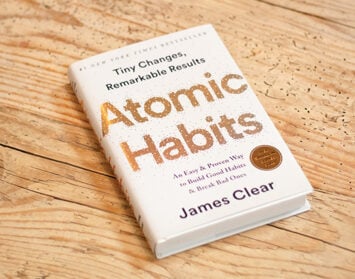By Jason Hughes
Returning to the office doesn’t have to be a battle between employers, employees and their stakeholders.
Few stories get more backlash these days than those reporting on CEOs mandating their team return to the office. As portrayed by the media, these soulless leaders are power mongers with zero empathy for their teams’ well-being.
While clickbait won’t disappear anytime soon (although on this topic, it is fading), we thought we would share our objective experience, as well as those of a large percentage of our clients, and even top industry business leaders from around the nation, in the event you’d be interested in the less sensationalized, but absolutely true, version of the Work-from-Home (WFH) and Return-to-Office (RTO) movement.
We are Back in the Office & Why You Should Be Too
Since our founding in 2011, Hughes Marino has been delivering inspiring workspaces for our clients, where teams come together to do amazing things. Yes, we are in the business of helping companies find and negotiate office, industrial and lab space; facilities that inspire and attract great talent; places where the very best work gets done. So, it should come as no surprise to learn that Team Hughes Marino is back in person working in all of our amazing locations.
Like most companies, we quickly embraced a remote work strategy throughout the Covid-19 pandemic, and we will be eternally grateful to our amazing team members who didn’t miss a beat and actually increased productivity during uncertain times while working from home. With this in mind, and with the pandemic finally in the rear-view mirror, I am thrilled to finally be able to say what I’ve wanted to say for the last three years—“Welcome Back!” In response to all the articles I see claiming that office buildings will be rendered obsolete, I say, “Not so fast.” We certainly learned a lot over the course of the pandemic, and we intend to embrace and apply what we’ve learned. Which is why we have implemented a four-day in-office work model, giving our team the freedom to choose where they work, be it at the office or at home, one day each week. We experimented with a three-day in-office work week, but it wasn’t delivering on the gathered team experience that we are all so hungry for.
Coming from a full work-from-home experience, it was an unbelievable change being able to get instant advice from teammates on their best practices and processes. I never truly understood what I was missing out on the past two years!
— A Hughes Marino Boston Broker
Support for the Four-Day In-Office Work Model
In a three-day model, if half of the team chooses to work in-office Monday through Wednesday while the other half of the team opts for Wednesday through Friday, then the team is only together in the office one day each week! And that just isn’t enough time together for the kind of interaction, team building and collaboration that has fueled our award-winning team culture from day one. With the four-day in-office work model, we are guaranteed at least three days during which everyone will be gathered together. And while we’d really love to see everyone four or five days each week, we believe that, at a minimum, those three days will create the synergies that will continue to drive our success and our growth.

It is too early to fully understand the disadvantages of remote and/or hybrid working, but we’re starting to see study after study that “performance” and productivity are waning. Many business leaders believe their employees have become “soft,” meaning less strategic, motivated and competitive, due to the work-from-home era over the last three years. That softness in turn leads to shortcuts, lack of culture and lower performance. Ultimately, the company that is most competitive thrives, and those that languish become extinct. Business cycles ebb and flow, just like the sun rises and sets. It’s a universal law. Most economists and business leaders believe we are starting the “ebb” cycle, and if a company intends on being competitive, they need to be optimized and connected as a team. That happens best IN THE OFFICE.
One of our team members who joined us in our Boston office wrote to me recently: “Coming from a full work-from-home experience, it was an unbelievable change being able to get instant advice from teammates on their best practices and processes. I never truly understood what I was missing out on the past two years!” How’s that for validation?
Major CEOs Share Similar Sentiments
The RTO won’t just be an employer mandated phenomenon. The next generation of workers don’t know what they’ve been missing. There will be millions of ambitious young professionals that will want every “edge” available to them for success—and being in the office to get “instant advice” on “best practices,” or to get face time with their managers and executives, will be paramount.
Legendary business leaders from Apple, Disney, JP Morgan, Salesforce, Starbucks, Google and Goldman Sachs, to name a few, are all now mandating a minimum of three days in the office—and many are now at four days in the office. Why would some of the most successful, well-capitalized leaders push for mandates that they know many employees won’t like? They know it is imperative for their continued, long-term success.
Over the last 18 months, the tech sector has seen over 250,000 high-paying jobs eliminated. As many leaders have been forced to do layoffs, most favor retaining a team member who is committed to coming into the office versus someone remote. As companies and remote employees alike have experienced, there is no stickiness—for either party—when there is no continued connection between the parties.

Amazon CEO Andy Jassy said that he doesn’t believe Amazon can operate at its full potential without workers coming back to the office.
David Risher, CEO of ride-hailing giant Lyft, reversed course on their “fully flexible” work policy, saying that “things just move faster when you’re face to face. There’s a real feeling of satisfaction that comes from working together at a whiteboard on a problem.”
Redfin CEO Glenn Kelman changed his mind about remote work in a recent return-to-office requirement. He noted that “It’s been hard to form new relationships and people connect better face to face.”
Open AI CEO Sam Altman says the work-from-home “experiment” was a mistake—and “it’s over.” Altman says remote work and the idea that startups didn’t need to be together in person was “one of the tech industry’s worst mistakes in a long time.”
Sharing the Why
We all experienced what we hope was a once-in-a-lifetime (or many lifetimes) global pandemic. That rattled everyone, but it’s now over. We all worked our best together before the pandemic, otherwise we wouldn’t have done it that way for decades. Everything from “work balance” to “predictors of happiness” studies prove “time spent with others” has a clear link to happiness, and over time that will become more and more clear to the naysayers. But in reality, most of those companies who wait for additional proof will likely become extinct themselves.

Are office buildings going to become obsolete? Not a chance. We believe teams that come together in person to share and collaborate are the teams that will win in a competitive marketplace. In the immortal words of business savant Peter Drucker, “culture eats strategy for breakfast.” The marketplace is the arena where businesses compete, and it will be the ultimate arbiter that rules in favor of in-person working. With all the talk of an imminent recession, now is the time to come together and get to work. Once integrity-driven employees understand the “why,” they will often immediately jump on board with returning to the office. Or, as one of our company business coaches, Mike Robbins, has said to us, “we all have different roles, but our job is the same—to help the team win.” The vast majority of teammates always want to help the team win, and those that don’t shouldn’t be on the team in the first place.
Onward!
Jason Hughes is founder of Hughes Marino, a global corporate real estate advisory firm that specializes in representing tenants and buyers. A pioneer in the field of tenant representation, Jason has exclusively represented tenants and buyers for more than 30 years. Contact Jason at 1-844-662-6635 or jason@hughesmarino.com to learn more.










